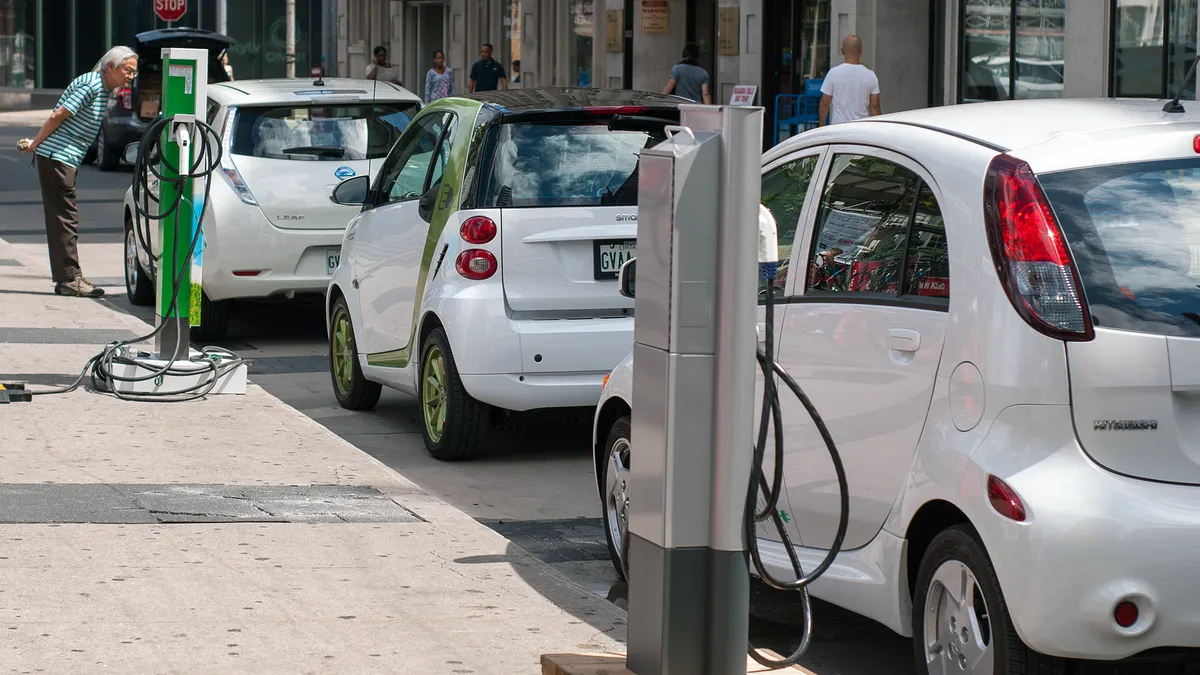Dive Brief:
- Staff of the New Jersey Board of Public Utilities last week published a straw proposal on the state's plan to build out electric vehicle charging infrastructure, with an underlying objective to attract private capital into the sector and "substitute shareholder dollars for ratepayer capital wherever possible."
- Consumer advocates say issues of system equity and charging station ownership are likely to dominate the discussion. "Utilities will press to own more," Sierra Club's New Jersey Senior Chapter Director Jeff Tittel told Utility Dive.
- The transportation sector is the single largest source of New Jersey's carbon emissions, at roughly 40%. Gov. Phil Murphy, D, wants the state to have 330,000 emissions-free vehicles on its roads by 2025.
Dive Insight:
New Jersey ended 2019 with just over 30,000 EVs on its roads, so it will need to see rapid adoption to meet Murphy's goal.
The straw proposal process "aims to really jump start the whole EV industry in New Jersey," said Tittel. "We really need to accelerate our programs and get them moving."
BPU staff will solicit stakeholder input on the proposal through a web-based public meeting on June 3, and will take written comments through June 17.
"New Jersey needs to create a comprehensive 'EV Ecosystem' that provides consumers with easy access to electric vehicle charging infrastructure," according to staff's proposal.
The web meeting will include a series of panel discussions to address how the state can best expand infrastructure development, ensure equity in the EV Ecosystem, and design and integrate EV charging into the rate structure.
The proposal's "standardized approach" will be a "shared responsibility" model, where utilities invest in and earn a return on the wiring and backbone infrastructure "and the private sector owns, operates and advertises" the charging station infrastructure, according to the BPU.
Tittel said that delineation is likely to cause some tension, as utilities naturally seek to own more of the infrastructure, including stations. Sierra Club's position is that utility ownership of charging stations is unnecessary in many areas where the private market will likely make the investment, he said.
"Utilities should play a role in charging stations, but if it's anything to deal with the ratepayer then it should be for those underserved areas where the private charging companies are not going to put in stations," said Tittel. "You don't need PSEG to put in a charging station downtown ... The market will take care of it. But in blue collar communities, it would make more sense."
PSEG has already proposed a $364 million investment in electric vehicle infrastructure that it says would support nearly 40,000 EV chargers, most of which would be residential.
"Making charging infrastructure readily accessible to all drivers is key to electrifying the transportation sector," PSEG spokesperson Mike Jennings told Utility Dive in an email. Electrification of the transportation sector will help the state improve air quality, reduce greenhouse gas emissions and achieve the clean energy goals in its Energy Master Plan, he said.
In January, Gov. Murphy issued a wide-ranging plan detailing how the state could achieve 100% clean energy by 2050, in part through the development of distributed energy resources and electric vehicles.
According to Jennings, utilities are "uniquely positioned to support universal charging access, addressing an otherwise unmet need," and he says the utility's EV proposal was designed to ensure the state meets its electric vehicle goals.
Tittel said the market should have plenty of opportunity for both private companies and utilities.
"Utilities are going to play a big role," he told Utility Dive. "There's a lot of work out there. We're trying to make a major change. ... But we want to make sure there is equity in the electrification of transportation."















